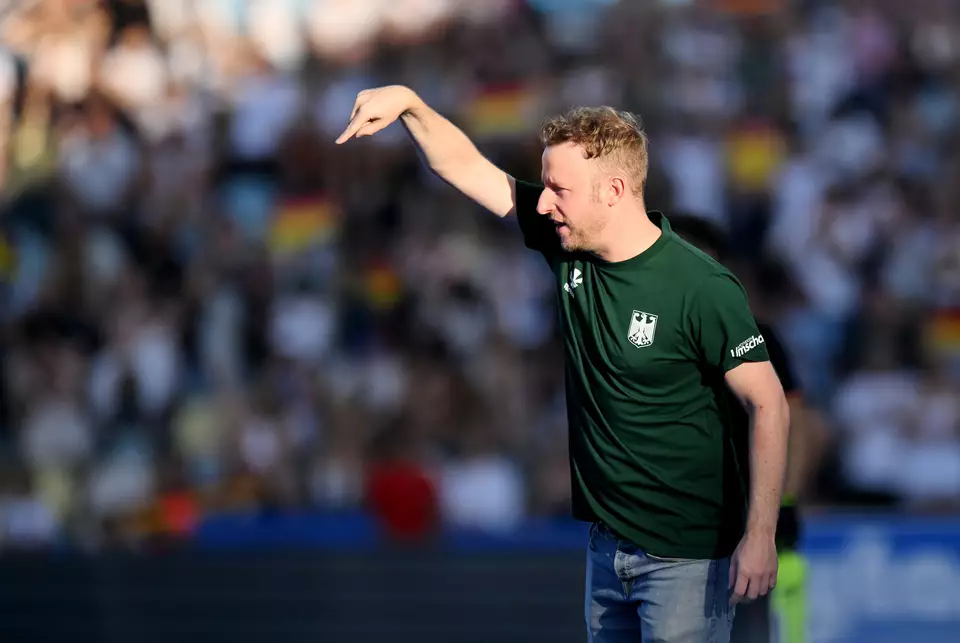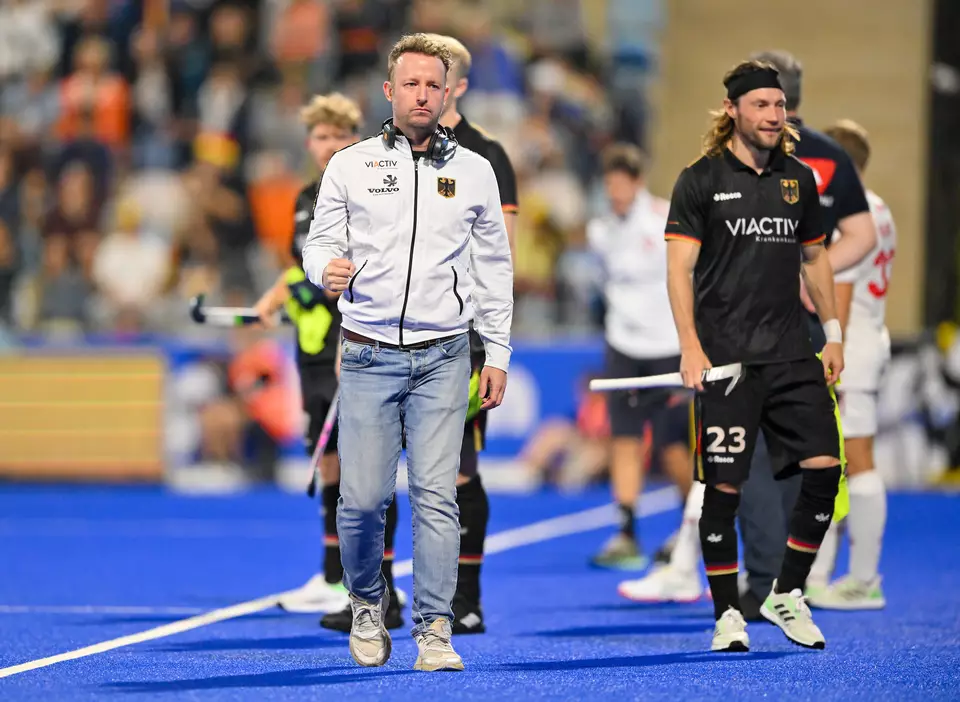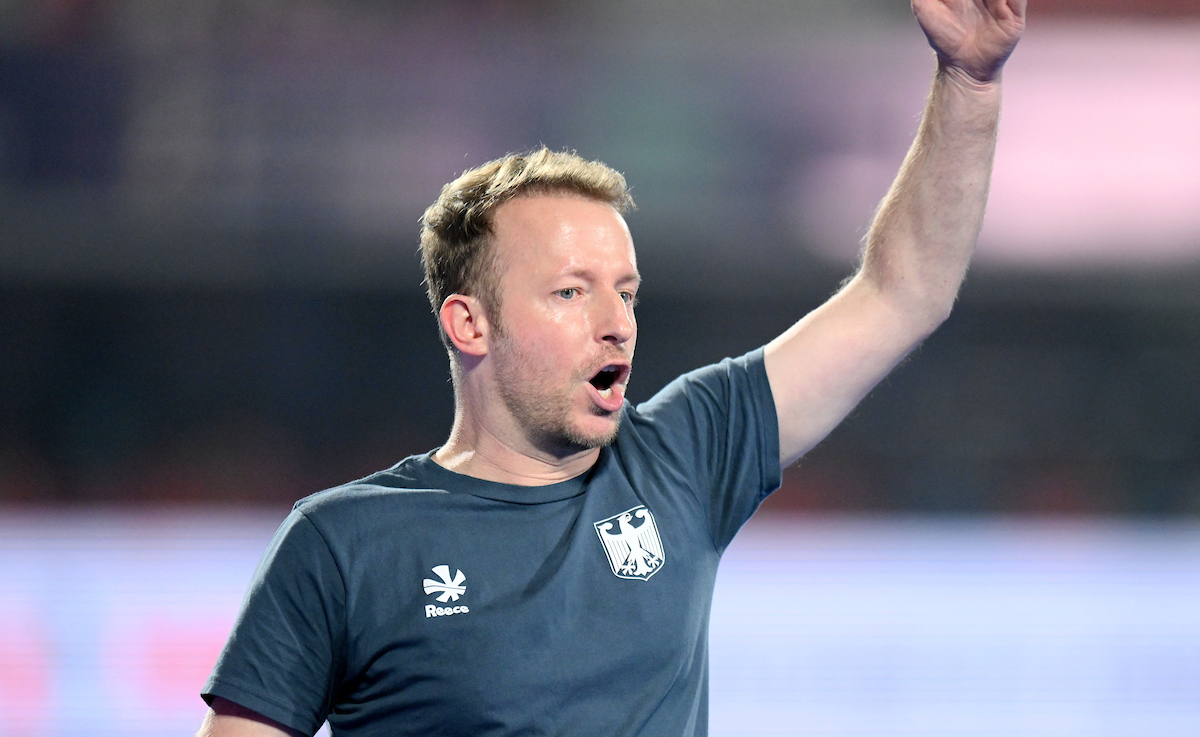Germany men’s national coach André Henning talks about how the EuroHockey affected his team and what will happen in the coming months until Olympic qualification
The home European Championships are some time ago now. What is your view of the event from a little distance?
Let’s start with the unconditionally positive part. The association organized a fantastic event and the fans created a good atmosphere. So the surroundings were ready for the title. Our sporting performance shows that we didn’t end up where we wanted to be – even if we narrowly failed in the penalty shootout. In the six months after the World Cup title, we didn’t always manage to let the spark fly completely.
This more mental component is understandable. A large part of the team has been chasing a major title for ten years, actually their entire lives. A small dent afterwards is not unusual. And yet we still had some really strong moments in the tournament. We defeated the eventual European champions Netherlands 3-0.
We dominated France under a lot of pressure, especially in the second half, and won 4-1, which was far too low. And in our opinion we are also the slightly better team in the semi-final against England. We score a clear goal that was taken back by the video referee. We are at least critical of that and assume that a 1-0 lead would have meant a very high chance of winning. But with the weak start against Wales and the disappointing performance in the game for third place against Belgium, we have painted a picture of ourselves that does not represent us. But I have the impression that the curve is going up quite steeply again.
In terms of sport, the performance was subsequently described as a disappointment. Are you going with me?
We are coming to a home European Championship as reigning world champions. Of course, from the outside perspective, anything other than winning the title per se seems disappointing. It was interesting to observe how before the World Cup no one – apart from ourselves – relied on us and six months later there were completely new expectations. As a coach, I obviously see more shades of gray. In world hockey, and the European teams have a decisive influence on this, six teams are almost on equal footing and anyone can beat anyone at any time.
So it was clear before the European Championships that little things decide whether you come fifth or become European champion. It was the same at the World Cup. These are supposedly small things, like Malte Hellwig’s failure in game three. We lacked a strong striker and going into a semi-final in such a tight tournament with one man less wasn’t an advantage either.
The first and last games of the tournament were far below our own expectations and the end shapes the overall impression. At the same time, we played really well in the semi-finals. We allow almost nothing defensively, score a supposed goal, have a huge chance shortly before the end and are very close to making it to the final. If we get to the final, we will be celebrated for reaching two major finals in just seven months thanks to strong defensive performance. But the assessment also includes the fact that we didn’t develop our offensive qualities at the European Championships. We are working on that.

How did the team and the players react to fourth place?
Insanely disappointed and self-critical. Of course we wanted to offer the many fans in the stadium and on the streams more success and more entertainment. I have the impression that it was good that we had a national team break after the event. This allowed the energy stores in the legs and head to be recharged. And we had some distance for a critical analysis.
What reasons did you find for your performance when analyzing the tournament?
The complexity of such a performance is of course huge, but we tried to analyze it as simply and clearly as possible. A large part of our quality comes from our connection with each other, which naturally arises on and off the pitch. Before the World Cup we had a lot more time together. This was shown in the coordination and especially in the coordination with the ball on the pitch.
The strong connections ensured a high level of resilience and agility, which helped us to turn around deficits in a short time or to respond to developments within the tournament as quickly as possible, discuss them and implement them in the next game. The time for the European Championships was significantly shorter, we had to make drastic cuts and compromises in a few areas – probably in the wrong places. A European title would still have been possible, but with the quality and intensity of the preparation we increase the probability of success. This is the lesson and task for the coming months.

We are now also looking forward. The Olympic Qualifier is coming up in January. What are the plans until then to prepare the team for the tournament?
We already had our first mini camp. This is a short course during the Bundesliga season. Our competition does this every week, but for various reasons we manage to do it once between August and November – this illustrates the aforementioned discrepancy in the time we spend together. This isn’t meant to be a complaint, just a description of the status quo. I am grateful that we now have this opportunity, because there is a lot of support from the hockey league and the clubs so that we can build this bridge – and that is very good for us.
The training sessions sharpened the pace and the theme of connection on and off the pitch. Due to the very high stress in the past few weeks, we have trained less hockey this time in order to take the clubs’ wishes into account. We used this to incorporate workshop elements that helped us orient ourselves towards the qualifiers and, ideally, towards Paris. There was feedback and, above all, feedforwards as well as the opportunity to deepen our processes. The hot phase starts in November with a course in South Africa and continues in December with a tournament in Spain.
The goal is clear, the opponents are not yet final. It is not yet officially clear where you will play the qualifier. How do you deal with it?
We think it is quite likely that we will play in Oman, and the same applies to possible opponents. There could well be two opponents from the Pro League waiting for us in our group: Great Britain and New Zealand. But we won’t actually find out until November. That doesn’t cause us any problems. Our aim is to show our top hockey in January, whether in Muscat or Valencia. We want to dominate the tournaments and send a signal that we are a force to be reckoned with in 2024.
What tactical changes/developments did you notice at the European Championships and what do you expect in the Olympic year?
During the World Cup we worked a lot on our coverage in our own area. It was interesting to see that some nations copied this after the World Cup, especially because we allowed significantly less in space when it came to long corners than we had before in man-marking.
I have the feeling that the basic setting is set for most teams, but we are of course excited to see who will try something out at this point, shortly before the Olympics. We will continue to work intensively, structurally German hockey may always have more difficult conditions. We are open to innovations and will use the intelligence of the entire team to gain a small tactical advantage.




